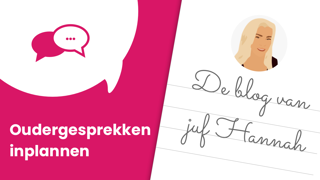Do you remember how that used to be? To register parent interviews, parents had to indicate on a registration list when they could come for a parent interview. Parents were expected to be able to get into school to enroll. When the list was hung on Monday, you as a parent had to be quick, because otherwise most times were already occupied. I remember well that this was quite an organization for myself as a teacher. This had to be hung up in time in the classroom so that parents had: the time to register, but also not too far in advance, because otherwise there was a danger that they would forget the appointment. I must have been ready for a conversation a few times where parents had - quite unintentionally - forgotten. The advantage of Gnap is that the child conversations are easy to plan for the group leader. The time slots are determined and with the push of a button you reach all parents. These parents get a notification on their mobile and can then easily choose a time slot. When the date for the interview approaches, parents receive a reminder on their phone. Conversations online or in real life are both possible. The latter is my preference.
Together with parents, you agree during a conversation what is needed to let the best flow out of the child. It is important for a person to feel and have responsibility for their own learning process. I like to conduct my conversations where the child is present. Because how do we want the child to feel responsible, if these conversations take place without them being there? After all, it's about them... In order to teach children to deal with themselves, the other and the world, it is important that children, parents and the teacher share their experiences and together investigate how the child can best be guided.
This reminds me of a parent conversation I had about 10 years ago. It was a care talk. The child (I will call him Jan from now on for the sake of convenience), his Parents, the teaching assistant and I sat at a table in the classroom.
Jan was not comfortable in his own skin. With a hypersensitivity to external stimuli, the communal activities were heavy for him. The teaching assistant helped him keep an overview of the day a number of times a week.
He was hunched over. "I want to participate just like the other children. I like it... But the lights, the sound, the movements of so many people... I find it difficult." Jan sighed deeply again. The last 2 week closures had not "succeeded" with him. He had read a book in class until the week-end was over and the children came back full of stories. The stories made him happy... But he would have preferred to have participated in it. He was clearly stuck with it...
Jan's mother stroked his back. A moment of silence followed. Jan looked around for a moment and we continued the conversation with something lighthearted: his birthday. Two weeks before, he had celebrated his 10th birthday: "Do you know what my best gift was Hannah?" Of course I asked him to tell me more. "Photographing," he continued with a smile.
For his birthday he had received a camera. He proudly told about photographing his cat and the people on his birthday. Lights went on in his eyes. "At first I didn't really know how the device worked, but the longer I practice with it, the better it goes. It gives me peace of mind to look at it again later."
Meanwhile, his mother also had a smile on her face: "It's a hit, this gift". At home it was sometimes a bit of a search with Jan, to monitor his well-being.
We talk about photographing when the teaching assistant suddenly shouts "I have an idea! What if you become the school photographer of the school?" She just doesn't get up from her chair yet.
Jan looked at her handcuffed... "Me?" "Yes!" she continued. "You take the photos during the week closures and share them with the different groups".
He looks at me a bit hesitantly but with the same lights at "Is that allowed?" "Of course you can!" I say: "What a wonderful idea!"
Jan had a task for the week closures. Photographing the performances, sorting the photos and distributing them. Because of the frame in the camera, he had peace. What happened on stage was not so explosive for him anymore, it was manageable. During the week closure I watched him regularly. With a smile on his face, he fulfilled his task. Significant.
Because we had sat together and the child had the opportunity to participate in the conversation, we had come to a solution. One in which the child was empowered and he could participate in the school event.
I often think back to this story. Rethinking my colleague taught me a valuable lesson that I am still grateful to her for!
Until next time!
Love Hannah.
"Tell me and I'll forget...
Teach me and I'll remember..
Involve me and I'll learn."
